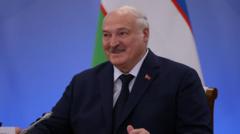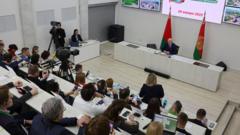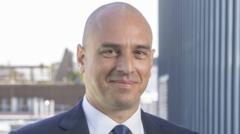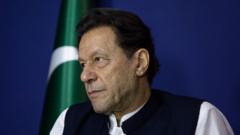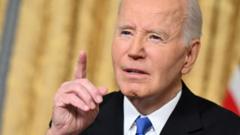Ghana’s former president, John Mahama, faces tremendous pressure from voters to address pressing economic issues and corruption following his recent electoral victory.
Ghana's New Leadership: High Hopes and Heavy Expectations

Ghana's New Leadership: High Hopes and Heavy Expectations
Ghanaians look for economic reform and accountability under President Mahama as he takes office with a pressing mandate.
In an impressive comeback, John Mahama claimed a decisive victory in Ghana’s elections, marking his return to the presidency after eight years in opposition. With 56.6% of the votes, Mahama outperformed Vice-President Mahamudu Bawumia's 41.6%, achieving the largest margin of victory in over two decades. However, a noticeable decline in voter turnout, particularly in NPP strongholds, indicates discontent with the outgoing government’s performance.
As excitement filled the air among Mahama’s supporters, Belinda Amuzu, a teacher from Tamale, expressed the general expectation for the new administration to revitalize the economy and tackle corruption effectively. Amid a severe cost-of-living crisis that has gripped Ghana since the economy’s downturn in 2022, the population hopes that Mahama will fulfill his campaign promise to prosecute corrupt officials and alleviate hardships.
Economist Prof. Godfred Bokpin evaluated the challenges awaiting the Mahama government, emphasizing the urgent need for credible leadership and streamlined governance. Mahama pledged to reduce his cabinet size, though analysts urge for more significant cuts and merit-based appointments.
Alongside him will be former Education Minister Naana Jane Opoku-Agyemang, poised to become Ghana’s first female vice president—a decision hailed by experts as a progressive step. Dr. Nansata Yakubu pointed out that Mahama’s survival in this competitive political climate will depend on jobs creation and tax relief, especially by removing various "nuisance taxes."
Facing criticism for his previous term’s energy crises, Mahama vows to transform Ghana into a “24-hour economy,” introducing incentives for nighttime business operations while promising to eliminate controversial electronic transaction levies. Nevertheless, skepticism remains among economists about the feasibility of these promises due to fiscal constraints.
As pressures mount, Mahama seeks to renegotiate terms related to Ghana's ongoing IMF bailout to generate funds for urgent social initiatives, targeting the nation’s high poverty levels. His intent to improve Ghana’s financial management comes with a recognition of prior economic missteps.
Corruption remains a focal issue, as Mahama’s administration will need to prove its commitment to accountability after a history of scandals within prior governments, including the current administration’s controversial projects. The newly elected leader assures that special courts will be established to prosecute wrongdoers.
In his victory speech, Mahama acknowledged the elevated expectations of the public, asserting the urgency to fulfill their aspirations or face penalties at the polls. “Our best days are not behind us; our best days are ahead of us. Forward ever - backwards never,” he reiterated, setting a hopeful yet challenging tone as he prepares to navigate a complex political landscape.
As excitement filled the air among Mahama’s supporters, Belinda Amuzu, a teacher from Tamale, expressed the general expectation for the new administration to revitalize the economy and tackle corruption effectively. Amid a severe cost-of-living crisis that has gripped Ghana since the economy’s downturn in 2022, the population hopes that Mahama will fulfill his campaign promise to prosecute corrupt officials and alleviate hardships.
Economist Prof. Godfred Bokpin evaluated the challenges awaiting the Mahama government, emphasizing the urgent need for credible leadership and streamlined governance. Mahama pledged to reduce his cabinet size, though analysts urge for more significant cuts and merit-based appointments.
Alongside him will be former Education Minister Naana Jane Opoku-Agyemang, poised to become Ghana’s first female vice president—a decision hailed by experts as a progressive step. Dr. Nansata Yakubu pointed out that Mahama’s survival in this competitive political climate will depend on jobs creation and tax relief, especially by removing various "nuisance taxes."
Facing criticism for his previous term’s energy crises, Mahama vows to transform Ghana into a “24-hour economy,” introducing incentives for nighttime business operations while promising to eliminate controversial electronic transaction levies. Nevertheless, skepticism remains among economists about the feasibility of these promises due to fiscal constraints.
As pressures mount, Mahama seeks to renegotiate terms related to Ghana's ongoing IMF bailout to generate funds for urgent social initiatives, targeting the nation’s high poverty levels. His intent to improve Ghana’s financial management comes with a recognition of prior economic missteps.
Corruption remains a focal issue, as Mahama’s administration will need to prove its commitment to accountability after a history of scandals within prior governments, including the current administration’s controversial projects. The newly elected leader assures that special courts will be established to prosecute wrongdoers.
In his victory speech, Mahama acknowledged the elevated expectations of the public, asserting the urgency to fulfill their aspirations or face penalties at the polls. “Our best days are not behind us; our best days are ahead of us. Forward ever - backwards never,” he reiterated, setting a hopeful yet challenging tone as he prepares to navigate a complex political landscape.






